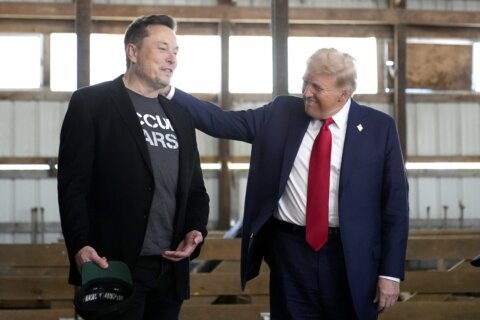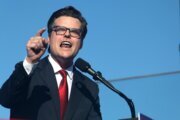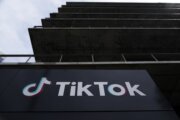WASHINGTON (AP) — Congressional Democrats are teaming up with the Biden administration and a progressive advocacy group to turn policy efforts to curb “ junk fees ” into a political rallying cry, betting that a small but potentially potent kitchen table issue will resonate with voters.
President Joe Biden promised in this year’s State of the Union address to target unexpected fees tacked on to things like plane and concert tickets, hotel rooms, hospital and cellphone bills and housing transactions. He’s since worked with major businesses to see that pricing is more transparent about all fees.
More than a dozen House Democrats around the country plan to hold events organized with help from the Progressive Change Institute to promote the administration’s effort to curb junk fees. Events have already happened in suburban Detroit, Philadelphia, central New Jersey and Albuquerque, New Mexico. Similar efforts are planned in coming weeks in Pittsburgh, New York and Las Vegas, as well as in Wisconsin, Ohio and North Carolina. Still others are in the works.
“Hidden and deceptive junk fees cost Americans billions of dollars every year,” said Rep. Hakeem Jeffries of New York, the Democratic House leader. “House Democrats will continue to work with President Biden to fight these excessive fees, hold corporations accountable and lower costs for families across the country.”
Rep. Elissa Slotkin a swing-district Michigan Democrat who is now running for the Senate, is planning an event in a few weeks and said “the administration’s initiative to eliminate junk fees will put money back in peoples’ pockets.”
Fellow Michigan Democratic Rep. Rashida Tlaib referred to seat assignment fees in saying she was “taken aback to see airlines charging more for you to sit next to your child” during an event last week at a health center outside Detroit with Democratic Rep. Debbie Dingell.
The push is part of “ Bidenomics,” the president’s effort to stimulate the economy by increasing social spending in ways he says can strengthen the middle class. It could ease the sting of inflation, which has moderated in recent months but remains high. But it may also help Biden bridge the gap between an economy that many metrics show is strong — with low unemployment rates and wages rising — and polling suggesting that many Americans don’t view that as a positive for Democrats.
“We’ve got to be in a position to show people what we’ve done,” Biden said at a fundraiser last week for his 2024 reelection campaign in New Mexico, referring to public perceptions on the economy. He added: “It doesn’t show. It takes time for people to realize why that’s there.”
The Biden administration has used executive action to try to limit ticketing and medical fees, and used federal agencies to try to curb unexpected charges in banking, airlines and other sectors. The president also announced in June that company executives meeting with him at the White House, including from Live Nation Entertainment, the parent company of Ticketmaster, and SeatGeek, had agreed to disclose more ticketing fees up front so consumers have a better idea of final pricing as they comparison shop.
House Democrats have introduced legislation to crack down on unexpected fees and, at their events, some are seeking to localize the issue, inviting people to speak about their experiences of being forced to pay them.
One such story comes from Joe Pfister, a 36-year-old paralegal. He had been looking to buy a home for a year and a half and went for a tour of the Brooklyn co-op he eventually bought on the day before New York shut in the coronavirus pandemic in 2020. But he wasn’t expecting thousands of dollars in additional fees that came later from the mortgage lender, real estate agent and co-op company.
“They just kind of sprang up one at a time, and you just had to keep paying to move your application forward,” said Pfister, whose unexpected charges included more than $400 worth of questionnaire fees, $200 in COVID-19 cleaning fees and a $750 move-in deposit. “You were kind of on the ride and you couldn’t get off.”
The Progressive Change Institute’s political arm, the Progress Change Campaign Committee, was closely allied with Massachusetts Sen. Elizabeth Warren’s 2020 presidential campaign, which was built around championing consumer protections and promoting progressive causes through economic populism. Combating unexpected fees could be an extension of that theme, with appeals for progressives but also for moderate Democrats and swing voters.
“Fighting surprise junk fees is super popular and bipartisan with the public because everyone hates these abusive extra costs,” said Adam Green, the Progressive Change Institute co-founder.
The Democratic Congressional Campaign Committee, the party’s House campaign arm, says its members are spending the August recess trumpeting the economic impact of Biden-championed legislation promoting domestic microchip production and the Inflation Reduction Act, which advanced green energy and drastically increased federal social spending. But some lawmakers, including in competitive districts, are pointing to quelling junk fees as a pocketbook issue that voters will feel more immediately than data points about the larger economy.
“Bidenomics is about growing the middle class, which is why President Biden is spearheading the fight against junk fees that are unjustly raising costs,” said Kevin Munoz, a spokesperson for Biden’s reelection campaign.
The White House sees the effort as an example of good governance with bipartisan benefits. Consumer Reports conducted a 2018 survey that found that at least 85% of Americans have experienced a hidden or unexpected fee for a service in the previous two years.
Still, some Republicans dismiss the issue as a distraction that won’t have a lasting impact. “Dumpster fires polled better with the American people than Bidenomics, so extreme Democrats threw it in the garbage to talk about ‘junk fees’ because they know Biden’s economy is trash,” quipped Will Reinert, a spokesperson for the National Republican Congressional Committee, the GOP’s House campaign arm.
Republican South Carolina Sen. Tim Scott, who is now running for president, told Fox News Radio in February: “Having fee control, income control, price control, it sounds more like socialism than free markets and capitalism.”
The Biden administration says industry groups have embraced greater transparency on fees, believing they can give consumers comparing prices a more accurate picture of costs — as long as they apply to everyone. But capping such fees is a different matter and could cause some pushback, it acknowledges.
“I think most people experience at least one kind of junk fee each month,” said Bharat Ramamurti, deputy director for the White House’s National Economic Council and a former top economic adviser to Warren. “Across party lines, there’s broad support for addressing these fees, either eliminating them or disclosing them up front so that people can shop with full transparency.”
Pfister predicted that combating hidden fees would get voters’ attention.
“I think this is very much a working class issue,” he said. “This is, I think, a good tactic for Democrats to take to show that they are on the side of everyday people — that they don’t respond to monied interests only and that they’re doing something to protect consumers.”
Copyright © 2024 The Associated Press. All rights reserved. This material may not be published, broadcast, written or redistributed.







